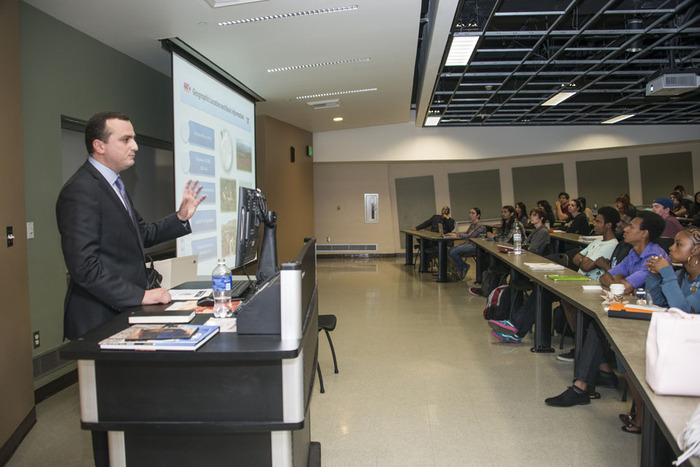CSUN Political Science Students Meet Foreign Representative from Washington, D.C.
It’s not every day that a foreign representative flies in from Washington D.C. to talk to college students. But political science students at California State University, Northridge had a rare chance to listen to Nagorno Karabakh Republic (NKR) representative Robert Avetisyan discuss his country’s situation on April 13.
Political science professor James Mitchell’s “American Political Institutions” students came to hear the other side’s perspective following a confrontational meeting with the Azerbaijan representative last month, during which many Armenian students in the class questioned the information he presented.
Hosted by the CSUN Armenian Student Association (ASA), the NKR representative came to give students his perspective on the tense situation between the neighboring states.
“Unfortunately, the existence of my republic is linked with the conflict,” Avetisyan said.
At the rise of World War I in 1918, the Soviet Union moved into the Caucasus region and made Azerbaijan and the NKR satellites of the state and redrew their borders. It wasn’t until 1991, with the weakening of the Soviet Union, that Azerbaijan and the NKR received independence. Ever since then, the two nations have been in conflict, at times violent, over regional land ownership.
“Since 1994 we began to restore our lives,” Avetisyan said. “It’s a tiny piece of land that’s easy to destroy and much harder to restore.”
With a population of 145,000 people on a piece of mountainous land roughly the size of Connecticut and wedged between Armenia and Azerbaijan, safety and stability are of upmost importance to the NKR’s existence, the representative explained.
Students asked questions of the republic’s hopes for diplomatic relations between the tense states.
One student wondered what the relations were like with Azerbaijan representatives who visited the republic.
“We attempted several times for them to come and visit us,” Avetisyan said. “Visits that do not imply political moves. Unfortunately after the visits, they go back to their country and say either the Armenians are starving and there is no life there, or, ‘you will be prosecuted and you will be oppressed.’”
During a presentation to the same class on March 16, Azerbaijan consul general Nasimi Aghayev said his country is making attempts at diplomatic relations. Many students questioned Avetisyan about the validity of the consul general’s claims of peace.
“There is no war or peace situation. We have almost every day shooting from the Azerbaijan side,” he said. “The deadly situation is very often, unfortunately.”
One such incident occurred on March 19, Avetisyan said, when 20 Azerbaijan militant troops attacked seven NKR private sites.
CSUN ASA President Christine Dashdemirians said having Avetisyan come to the campus was vital to giving both perspectives on the conflict between the two regions.
“A lot of people were uncomfortable about what was said about Armenia by the representative. Because of the Azerbaijan consul general’s presentation, we felt like the students were not educated properly,” Dashdemirians said. “We wanted to show both sides. We wanted students to see our side. Our topic was the result of what was happening in history. We’re very lucky that he adjusted his schedule to fly out here from Washington, D.C. It’s so important to our history that it be recognized.”
10 percent of CSUN’s student population is of Armenian descent – the highest student population of Armenians outside of Armenia. Avetisyan said it was important for students to understand about the culture and the political situation in the region.
“It is always important for us to reach out to learning communities – always,” he said. “We need to educate and spread truth and to offer our perspective on maybe the same range of issues, which is often misinterpreted.”
Avetisyan added that when there is a highly sensitive matter at hand, it is critical for students who may become involved in international affairs down the line to have a well-rounded understanding of the situation.
“It is important to know there are always two sides to a story, especially in a conflict situation,” he said. “It is very important to have a broader and more comprehensive understanding of the situation. And that required me coming here, which I was perfectly glad to do.”


 experience
experience